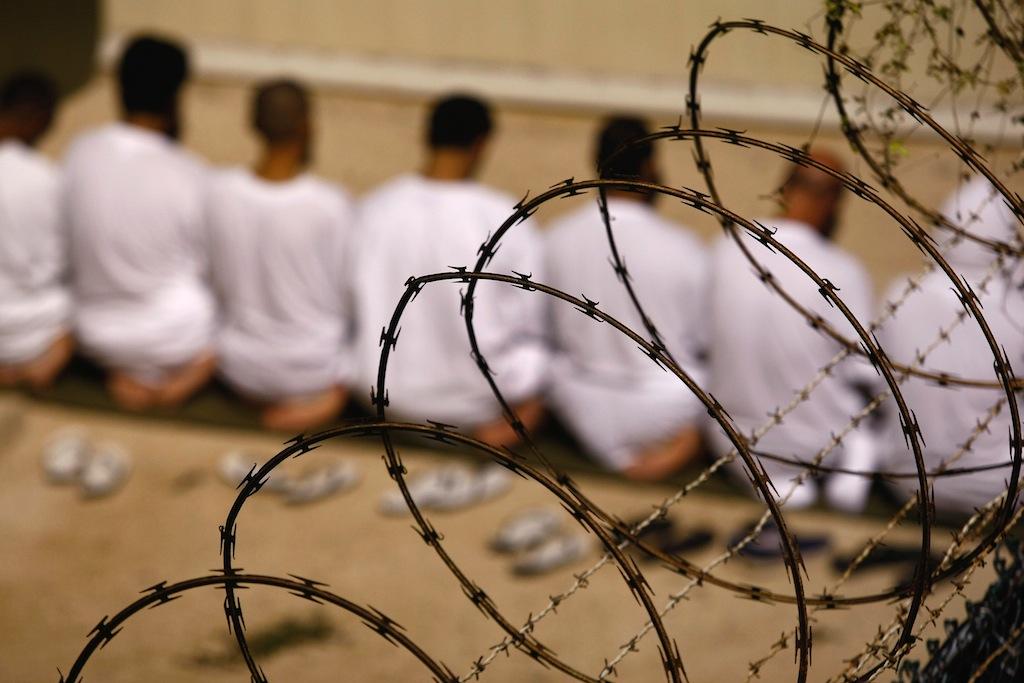Guantanamo Bay prisoner speaks out about hunger strike, “losing all hope”
A group of detainees kneels during early morning prayer in the camp at the US military prison for “enemy combatants” on Oct. 28, 2009 in Guantanamo Bay, Cuba.
A detainee held indefinitely at the US naval base on Guantanamo Bay, Cuba has spoken out about what sparked the weeks-long hunger strike that is causing the US military to force feed detainees.
In a declaration made public on Friday, Obaydullah said that mistreatment of the prisoners and a particularly brutal "shakedown" in February caused he and his fellow prisoners to join a hunger strike.
He was referring to an "unexpected, sudden and disrespectful" cell search on February 6 in "Camp 6," which had been known for housing 130 prisoners without disciplinary incident.
Prison officers took detainees' personal items, including, his blanket, sheet, towel, photos, medical necessities, legal documents, correspondence with his attorneys and "family photos, documents from my family."
"This has been especially distressing for me because I have done nothing to provoke the authorities to take my belongings and comfort items that gave me a small sense of humanity," Obaydullah said his declaration, signed on March 27 but made public Friday.
Obaydullah wrote that he and his fellow prisoners have kept on refusing food "because conditions have gotten worse, not better, and there is no hope that we will ever leave here."
An Afghan villager captured with diagrams of improvised bombs, Obaydullah has been at the naval prison for nearly 11 years.
His account is the most detailed look yet at what prompted 100 of the prison's 166 inmates to take part in the hunger strike.
Guantanamo spokesman Samuel House said that of those, 23 detainees are being fed through nasal tubes, and three are hospitalized but none face an "immediate health risk."
Obaydullah said he chooses to drink two cans of the nutritional supplement drink Ensure daily rather than be force fed through tubes, but other detainees have refused even the smallest amounts of food.
"I have seen men who are on the verge of death being taken away to be force-fed," Obaydullah said. "I have also seen some men coughing up blood, being hospitalized, losing consciousness, becoming weak and fatigued."
Some 86 inmates have been deemed eligible to be freed or transferred to their home countries, but, said Obaydullah, "they are also now living under these more harsh conditions just because the US does not know where to send them."
The minister of human rights for Yemen flew to Washington on Friday for talks she hopes will lead to at least some of the many Yemeni detainees being held at the prison being brought home.
Human Rights Minister Hooria Mahsour told the Yemen Post on Thursday that her ultimated goal was to see all 90 Yemeni prisoners return to their homeland, starting with the 56 an American court had already cleared for release.
AFP contributed to this report.
The story you just read is accessible and free to all because thousands of listeners and readers contribute to our nonprofit newsroom. We go deep to bring you the human-centered international reporting that you know you can trust. To do this work and to do it well, we rely on the support of our listeners. If you appreciated our coverage this year, if there was a story that made you pause or a song that moved you, would you consider making a gift to sustain our work through 2024 and beyond?
